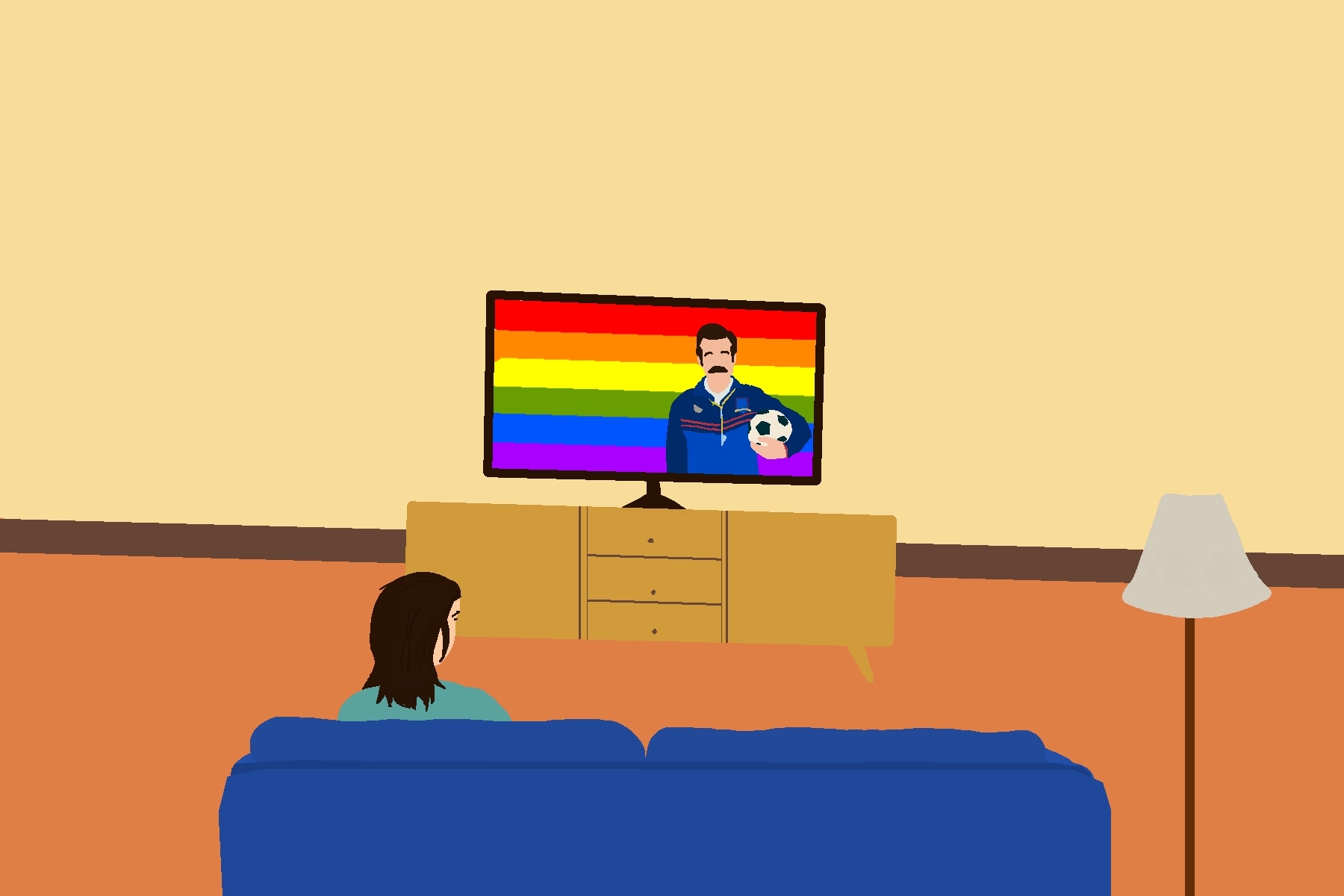Ted One of the most celebrated feel-good shows right now, “Ted Lasso” nails virtually everything. From the plot lines to the characterization, everything feels so natural. The same can be said about its handling of queer storylines. While there are fans out there confused about Colin’s (Billy Harris), Keeley’s (Juno Temple) and Trent’s (James Lance) queerness, the series has been leaving behind crumbs from the start. In season two episode three “Do the Right-est Thing,” Colin references Grindr when discussing Keeley’s latest PR project, Bantr. Meanwhile, Keeley makes multiple jokes about hooking up with Rebecca (Hannah Waddingham) throughout the entirety of the show. She even goes so far as to joke that she might “Dip my toe back into the lady pool,” These subtleties set the groundwork for the development of multiple queer storylines, despite many viewers dismissing them as mere coincidence, rather than intentional queer representation.
For so long, almost all queer media and representation has come in the form of the gay best friend stereotype, the bury your gays trope or a coming out storyline. While all of these storylines have been important stepping stones to getting more representation, seeing them be repeated over and over again without a modernized viewpoint becomes extremely saddening. Oftentimes the queer community feels that these are the only kinds of representation that are accepted by the general population, despite the plethora of experiences that exist within the LGBTQIA+ community. It’s difficult to continually be assaulted with only the most depressing storylines. While they characterize the experience of many in the community, queer people also deserve to see themselves represented in uplifting and joyous stories.
“Ted Lasso” does an outstanding job of handling its queer characters without falling too deeply into the typical plotlines. Colin’s character arc demonstrates the long road to acceptance, both from one’s peers, and one’s self. Like many pro athletes, he feels the need to hide his his sexuality for fear of ruining his reputation. Colin’s plight reflects the toxic masculinity and homophobia surrounding sports; many queer kids get pushed out before they even get the chance to make it big. Throughout the entire show, Ted (Jason Sudeikis) makes a clear effort to counteract the toxicity of professional sports by embracing more stereotypically feminine behavior like being emotional or needing a place to vent. In spite of all of Ted’s efforts, coming out can still be extremely difficult for a professional footballer, especially when hateful slurs are still being thrown around by fans. Colin understands this and instead prioritizes coming out to his team rather than the world at large.
Some fans worried that when Isaac (Kola Bokinni) found out before the rest of the team and gave Colin the cold shoulder, Isaac would turn his back on him just for being gay. In reality, Isaac just needed time to understand why Colin kept this from one of his best mates. While this isn’t the reaction anyone wants when they come out, it is extremely common. In the end, the two easily settled their issues and went back to being their normal selves.
Colin’s character helps give hope to queer men and boys in sports. Seeing someone be so easily accepted by their teammates without a single bat of the eye helps give people a brighter outlook on what is to come in the future of sports. While there’s a part of Colin that have hopes to be his authentic self in the public eye so he can “kiss his fella” after a match just like any other footballer, he knows he’s allowed to take his time. All too many of these coming out storylines have a sense of threat or blackmail surrounding them, forcing some characters to fully come out before they are ready. “Ted Lasso” wants no part in that. Instead, it allows its characters to grow naturally with the passage of time.
For Keeley, this meant eventually returning to the lady pool in the form of Jack (Jodi Balfour). Her storyline is handled just like any other straight person’s love interest. Girl meets girl. Girl likes girl. Girl dates girl. While the relationship has the nuances of any queer relationship, it’s clear to the audience that Keeley’s fluid sexuality should be normalized just like that of her heterosexual peers. For the entirety of the show, Keeley has been very clear and open about her sexuality. She’s a young, attractive woman, so why shouldn’t she explore all of the parts of her sexuality?
This openness that Keeley carries with her is such important representation for queer people. For those who are afraid to be their authentic selves all of the time, seeing queerness normalized, in a show about football nonetheless, helps to normalize it for everyone. No queer person should feel othered just because of who they are inherently, and Keeley’s character is no exception.
Mainstream queer representation is hard to come by, but “Ted Lasso” doesn’t shy away from it and instead embraces it. The show’s thoughtful and compassionate handling of its queer characters highlights the beauty and contradiction that naturally exist within the LGBTQIA+ community. It encapsulates the highs and lows of being a part of the community, without falling into stereotypes and tropes. It paves the way for future shows to incorporate similar characters and plotlines, and it does so while being one of the most popular shows on television currently. It reminds its audience time and time again to believe in oneself and believe in belief.

















